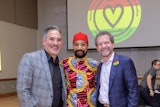When journalists across the country wanted to enrich their political news stories with a greater grasp of the evolving American political landscape, they always sought the opinions of Dr. Ronald Walters, an HBCU trained historian who became one of the nation’s most respected political scientists in the last half century.
As a teen in 1958, Walters helped lead “sit ins” protesting racially segregated lunch counters in his hometown of Wichita, Kansas, where he was leader of his hometown NAACP Youth Council. As an adult in 1963, he graduated from Fisk University, where he was inspired by former Fisk professors W.E.B. DuBois and John Hope Franklin. He went on to earn a Master’s and a Ph.D. from American University. He then began carving a niche that combined his activist and academic experiences into a career that saw him emerge as a leading thinker of his generation on American politics and how Black voters figured into it.
Blacks in politics became a very important topic nationally after passage by Congress in the late 1960s of the Voting Rights Act. The federal law empowered millions of Blacks and Latinos, especially in the South and West, to vote for the first time ever. Walters, always accessible and knowledgeable on his topic, was one of the few people of color in academia who did not shy away from reporters seeking his thoughts.
Walters, who retired last year from his post at the University of Maryland in College Park where he was professor of government and politics and director of the school’s African American Leadership Institute for more than a decade, died late Friday of cancer. He was 72.
“He was a major figure, very strong idealist who worked tirelessly for the ideals he believed in,” says Dr. David Bositis, senior researcher at the Washington-based Joint Center on Political and Economic Studies, a leading think tank that focuses on public policy issues and how they relate to Black Americans.
Bositis, who had known Walters more than 20 years, says he and Walters often had disagreements on issues, “but not about the ends. He was always looking at the way things should be,” Bositis says admiringly. “I was always looking at things as they are. There aren’t that many idealists around.”
Veteran journalist Sam Fulwood, who came to Washington in 1987 to cover politics for The Los Angeles Times, characterized Walters as one of the most thoughtful academic political analysts of his time. “It was essential,” says Fulwood. “He wasn’t a quote machine. He didn’t have clever, witty and catchy things to say. He gave us something of substance. Nobody took the subject he was dealing with that seriously,” Fulwood says, referring to the army of political analysts in Washington who are skilled at offering reporters quick, so-called “sound bite” quotes.
Walters, a low-profile academician whose measured, thoughtful analysis was his trademark, went the extra mile in a profession driven by the publish-or-perish mentality. He published at least six books on politics and wrote more than 100 academic articles on Blacks in politics. At his death, Walters was working on a book about President Barack Obama. Walters was frequently quoted in national newspapers and appeared often on national radio and television programs focused on politics.
Walters also put to work what he had learned and taught, serving as one of the early architects of the Congressional Black Caucus agenda, an aide to several Black members of Congress, a founder of the TransAfrica anti-apartheid group and campaign manager in 1984 for the Rev. Jesse Jackson in his first, and failed, bid for president of the United States.
Former CBS News correspondent Dr. Lee Thornton, who taught at Howard University during the same time as Walters and produced Jackson’s former television show, recalled Walters’ analysis as consistently “spot on.”
“He was the go-to person for intelligent political analysis on race issues,” says Thornton, who left Howard University shortly after Walters to take a journalism professorship at the University of Maryland.
Thornton and Walters, who taught political science at Howard for some two decades, were the topic of a heated front page editorial in the late 1990s in The Hilltop, the student newspaper at Howard. The paper, citing their departures, criticized Howard for allegedly not doing more to retain its top-level faculty and predicted Walters and Thornton would be “marginalized” as professors at Maryland. Both enjoyed distinguished careers at Maryland where Thornton, who retired from teaching this past summer, came back later as interim assistant provost for equity and diversity at Maryland. Walters’ widow was quoted in the Sunday edition of The Washington Post as saying Walters had recently agreed to return to Howard as a senior research fellow and lecturer.
Walters was described as an “intellectual giant” by Howard president Sidney Ribeau, who noted Walters has been an “intellectual mentor” to many of the nation’s “most prominent African-American political scientists” working at research universities around the country. He praised Walters as “a scholar and activist who applied the theory of politics in a manner that improved the lives of those in need.”















